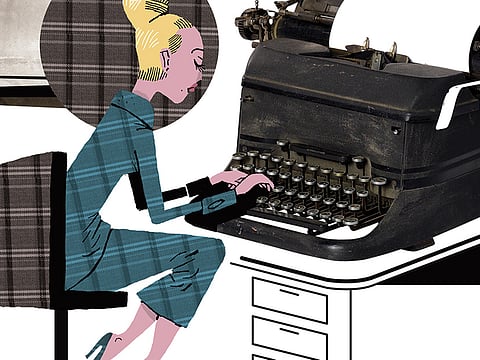Cold War, love and lies
The American wife of an English spy hides her political subterfuge behind social conformity in this deft debut

A Quiet Life
By Natasha Walter, The Borough Press, 448 pages, £15
As she watches the sun set over Lake Geneva in 1953, Laura Last, the diffident protagonist of Natasha Walter’s quietly impressive first novel, is a woman deprived of her identity and stranded between worlds. She is exposed to public opprobrium as the deceived wife of the traitor Edward Last, who abandoned her, pregnant with their daughter, two years earlier to defect to the Soviet Union with a friend purported to be his lover. Any status — social, political, legal — Laura might have won during the turbulent mid-century years has been stripped from her. Under surveillance by the authorities and living in exile, she is reduced to squabbling with her mother over childcare and waiting for cocktail hour, and appears to be the emblem of female submissiveness. But before Walter’s tense prologue draws to a close, we become uneasily aware that Laura has led a life of concealment and lies, and that it is far from over. She is in Geneva waiting for her old life to die — and for a sign that the new one may begin.
To unravel the journey that has brought her heroine to this crossroads Walter replays her life from the moment the young Laura Leverett leaves New York for London on the eve of the Second World War. With her father an American reprobate and her mother of genteel English stock, she is already keenly aware of inhabiting the margins. The ocean liner taking her to her new life among strangers offers her the microcosm of a world in transit in which she may find her place. In prospect are physical desire for a raffish young journalist and its concomitant shame, and her uneasy longing for the glamour of first class, and the certainty of belonging. She also experiences the first stirrings of political awareness when she encounters a young communist, Florence Blake, on her way to right the world’s wrongs in Europe.
Love and politics entwine in their relationship, never again to be disentangled. On arrival in England, in reaction against snobbish upper-class relatives who regard her with dismay, Laura is drawn to Florence’s fierce determination to achieve social justice — for men and women alike. “She told her that in a communist society every man and woman would be able to engage in meaningful work that really did spring from their personality ... that she was not part of the life mapped out for her.”
So the die is cast and Laura’s “quiet life” turns double. In secret she attends Florence’s rallies, only to return to the haute bourgeois comfort of her aunt’s drawing room, where she observes the ”boys’ club” of her entitled cousin Giles and his public-schooled friends. Working in high office, they exist in a closed world that she and her female cohort can only circle in vain, talking about dresses — until Laura meets and falls in love with one of their number, Edward Last. And when she discovers that Edward, the trusted servant of the state, is in fact working for Soviet intelligence, she embarks on the journey of paranoia and fatal compromise that will end in her precarious exile.
There is a rather dismal expectation that when a polemicist — and Natasha Walter, thoughtful and considered author of “The New Feminism” and “Living Dolls”, has not been afraid to nail her colours to that mast — turns to fiction, the result will not be a story but a tract. And when, early in “A Quiet Life”, Laura’s ambivalence as a mother is followed closely by Florence’s paean to a communist Utopia of equality, the possibility that the message is going to override the medium does present itself. But as the story gathers pace, the novel’s intelligent and determined examination of politics takes its proper place — subsidiary to character and in the background of a robust and well-plotted narrative.
As well as having a gift for cool, elegant phrasing, and a fine sensitivity to psychology reminiscent of Elizabeth Jane Howard, Walter proves to be a hardworking and accomplished storyteller. The scene in which Laura must steal, photograph and return documents from under the noses of both her husband and cousin is breathtaking, as are the protagonist’s agonisingly clumsy attempts to seduce a suspected double agent.
Walter is terrific, too, at capturing the tense, bleached-out dreariness of the Cold War in London and Washington, easily competing with the claims of such experienced novelists as Sebastian Faulks and William Boyd to the territory, and bringing to it a unique perspective that resonates long after the novel is laid down.
Laura’s muted existence of evasion and dissimulation, in which she is fatally underestimated as a frivolous flirt by her husband’s friends, was inspired by that of Donald Maclean’s wife Melinda Marling, “the communist in the Schiaparelli coat”.
Walter’s achievement is to bring espionage brilliantly into service as a metaphor for more routine secrets a woman has historically had to conceal, from menstruation to frustration, rage to alienation from the disfiguring role models we are offered. Its indelible image — a woman whose calmly conformist femininity conceals shocking subversion — leaves us wondering about our own mothers and grandmothers, and what went on beneath the surface of their quiet lives. It also confirms Walter as a writer who clearly appreciates the joys and purpose of fiction as distinct from polemic, and makes good use of both.
–Guardian News & Media Ltd
Christobel Kent’s “The Loving Husband” is published by Sphere.


